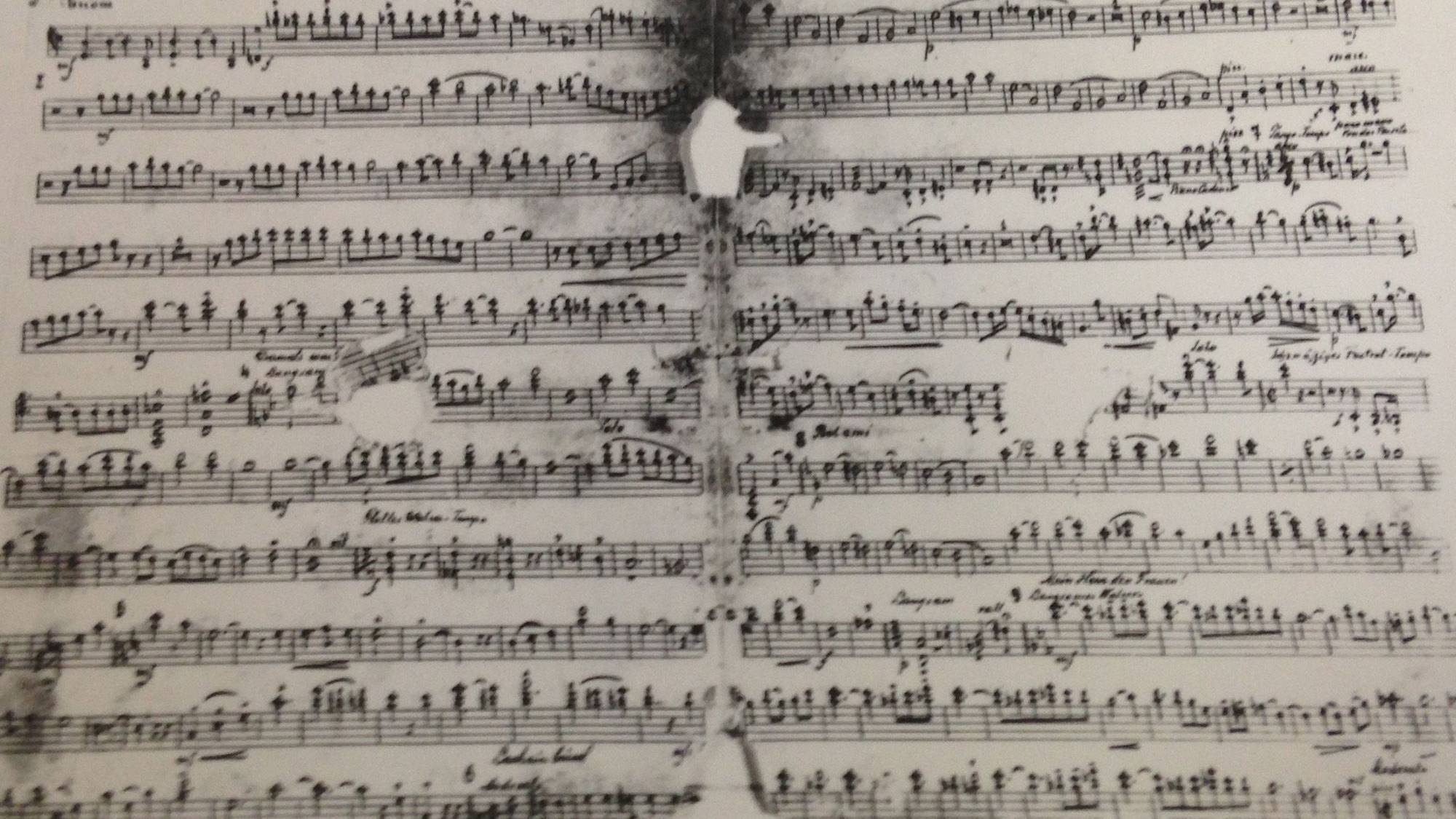Fragments of music scores found at Auschwitz were played for the first time in November 2023 after being restored by Junior Trinity alum, conductor, and tutor Leo Geyer.
On 27 November, Leo Geyer’s organisation Constella Music celebrated its tenth anniversary and relaunch with a special concert at Sadler’s Wells, featuring several new premieres and an exceptional team of performers. The concert included four restored pieces from Geyer’s new opera-ballet, The Orchestras of Auschwitz – a project that pays tribute to musicians murdered in Auschwitz and highlights the music written in concentration camps.
Back in 2015, Leo was commissioned to compose a musical score in memory of British historian and holocaust expert Martin Gilbert, who had died earlier that year. To deepen his understanding of the historian’s work, Leo visited Auschwitz and met with an archivist at the Auschwitz-Birkenau memorial and museum. It was here that he discovered remnants of musical scores arranged and played by orchestras at the camp: 210 pieces of varying completion – original compositions, arrangements, printed music.
“The music had been mostly destroyed so what remains is almost like a broken jigsaw puzzle, except there are several and they are all mixed in together,” said Leo when discussing the subject with CNN. Returning multiple times to Auschwitz, Leo Geyer also carried out extensive research into testimonies from the camp and its history of music. “There were, at one point, as many as six orchestras at Auschwitz and they were all very much sanctioned by the SS and in some cases commissioned by the SS,” Leo explained – often the instrument combinations were small and unconventional. For years, the women’s orchestra of Birkenau had no cellist until Anita Lasker-Wallfisch arrived – a survivor of the holocaust who still lives in Britain today. Her grandson, Simon Wallfisch, a baritone, took part in Constella’s performance.
In an online interview with the Holocaust Memorial Day Trust, Lasker-Wallfisch recalled: “That I survived nearly one year in Auschwitz is without any doubt due to the fact that I became a member of the camp orchestra. As long as the Germans wanted an orchestra, it would have been counter-productive to kill us. Our task consisted of playing every morning and every evening at the gate of the camp so that the outgoing and incoming work commandos would march neatly in step to the marches we played. We also had to be available at all times to play to individual SS staff who would come into our block and wanted to hear some music after sending thousands of people to their death.”
The orchestras sometimes played in private or for prisoners in secret, and rebelled in musical cryptograms, sending messages through music. Leo cites the weaving of the Polish national anthem into marching music as a good example of this. Having gone unnoticed for 80 years, the scores are now being brought back by Leo’s historic project – an important homage to the victims of Auschwitz.
The Orchestras of Auschwitz Research & Development week is taking place at the Laban Studio from Monday 11 – Friday 15 December, and will involve nine students from the TL Music faculty and four from the TL Dance faculty. Reflecting on his time at Trinity Laban, Leo says: “I attended Junior Trinity as a student many moons again, and this was when I first collaborated with dance. It was a lifechanging experience and in addition to teaching [composition and musicianship] at Junior Trinity, I have continued to work in dance ever since, securing my first job as a conductor with The Royal Ballet. It is therefore most fitting to be developing my most significant dance work with Trinity Laban.”
A composer, conductor, presenter, founder and artistic director, Leo Geyer holds a diverse career spanning across opera, dance, film, and concert music. He has established a reputation for his reimaginings, which creatively engage with music of the past, and is currently studying for a doctorate in opera-ballet composition as the Senior Music Scholar at St Catherine’s College, Oxford. His music has been described by The Times as “imaginative and beautifully shaped”, and has received performances by ensembles including the English Chamber Orchestra, London Sinfonietta, Rambert Dance Company and Opera North.

